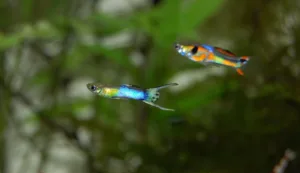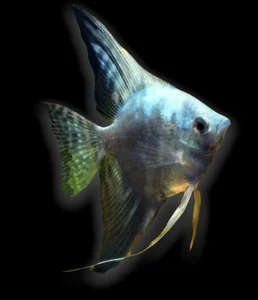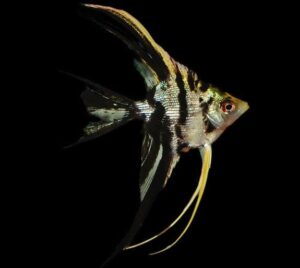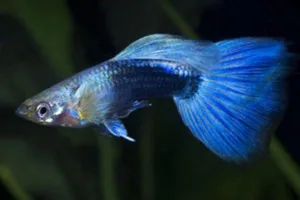If you’re considering adding guppies to your aquarium, you might wonder, “Are guppies tropical fish?” In this comprehensive guide, we will explore the fascinating world of guppies, their natural habitat, care requirements, and other vital information to help you provide the best environment for these vibrant aquatic creatures.
Guppies: The Tropical Wonders
Guppies’ Native Habitat
Guppies (Poecilia reticulata) are indeed tropical fish, originating from the freshwater streams and ponds of Central and South America. Their natural habitat includes countries like Venezuela, Trinidad, and Barbados, where warm and stable tropical climates prevail. In the wild, guppies thrive in water temperatures ranging from 75°F to 82°F (24°C to 28°C). This makes them well-suited for tropical aquariums.
Temperature Requirements
To ensure the well-being of your guppies, it is crucial to maintain a tropical water temperature in your aquarium. Aim for a consistent temperature between 75°F to 82°F (24°C to 28°C). Use a reliable aquarium thermometer to monitor and adjust the temperature as needed. Sudden fluctuations can stress your guppies and may lead to health issues.
The Importance of Tropical Water Parameters
Water pH Level
Guppies prefer slightly alkaline water with a pH level ranging from 7.0 to 7.6. Maintaining the correct pH is vital for their overall health and breeding success. Regular water testing and adjustments are essential to create a suitable environment.
Water Hardness
Guppies thrive in moderate to hard water conditions, with dH levels between 10 and 20. You can use water hardness test kits to measure the dH levels in your aquarium and adjust them accordingly.
Water Filtration and Aeration
Investing in a good quality filter and an air pump is important. Guppies benefit from well-oxygenated water with efficient filtration. Ensure proper water circulation and oxygenation in your tank to keep your guppies healthy.
Guppies: The Perfect Tropical Aquarium Inhabitants
Peaceful Community Fish
One of the many appealing aspects of guppies is their peaceful nature. They are excellent choices for community aquariums, coexisting harmoniously with various other fish species, such as tetras, mollies, and platies. Their peaceful demeanor makes them suitable for beginners and experienced aquarists alike. Are Guppies Aggressive?
Colorful Varieties
Guppies are renowned for their vibrant colors and striking patterns. They are available in a wide range of color variations, including neon blues, fiery reds, and intricate patterns that can rival any work of art. This diversity adds an element of excitement and aesthetic appeal to your tropical aquarium. Top 100 Most Beautiful Guppy Varieties You Should Know About
Tropical Plants and Guppies The 5 Best plants for your guppy fish tank
Incorporating live aquatic plants in your guppy aquarium not only enhances its natural beauty but also provides hiding spots for your guppies. Some preferred choices include Java moss, Amazon sword, and anubias. These plants contribute to a lush and healthy ecosystem while serving as places for guppies to take refuge and breed. Are Guppies Schooling Fish?
Feeding Guppies
Guppies are omnivores and have a hearty appetite. A balanced diet includes a mixture of high-quality flake or pellet food, live or frozen foods like daphnia and brine shrimp, and occasional vegetable matter. Feed your guppies in small portions a few times a day to keep them healthy and satisfied. Best Guppy Food
Guppy Breeding: A Tropical Tale
Guppy breeding is a fascinating aspect of keeping these tropical fish. Guppies are known for their high reproductive rates, with females giving birth to live fry. If you plan to breed guppies, consider a separate breeding tank to protect the fry from adult guppies who might see them as potential snacks. How to Breed Guppies
Guppies and Tank Mates: Choose Wisely
Compatible Tank Mates
While guppies are generally peaceful, some tank mates may not be suitable companions. Avoid aggressive or fin-nipping species like tiger barbs or cichlids. Opt for peaceful and similarly sized species that share the same water parameters. The 50 Best Guppy Tankmates
Disease Prevention
Guppies are susceptible to common aquarium diseases. Quarantine any new fish before introducing them to your guppy tank to prevent potential disease outbreaks. Regular water changes and maintenance are key to ensuring a healthy environment for your guppies.
Guppy Gender Dynamics
Understanding guppy gender dynamics is essential to maintaining a balanced and healthy tank. Male guppies are more colorful and have longer fins, while females tend to be larger and less flashy. Keeping a proper ratio of males to females helps prevent excessive male aggression and harassment.
Tropical Aquarium Maintenance
Regular Water Changes
Frequent water changes are crucial for maintaining water quality. Replace approximately 20% of the tank water every 1-2 weeks, using a siphon to remove debris from the substrate. This practice helps to keep the water clean and ensure the well-being of your guppies.
Aquarium Size
When deciding on the size of your guppy tank, consider that guppies are active swimmers and breed prolifically. A 10-gallon (38-liter) tank is suitable for a small guppy colony, but a larger tank allows for more room and reduces the risk of overpopulation. How to Set Up a Guppy Fish Tank: The 10 Step Guide for Beginners on setting up a guppy fish tank
Tank Decoration
Enhance your guppy aquarium with natural decorations and substrates. Guppies appreciate hiding spots, plants, and driftwood, which mimic their natural habitat and provide them with security.
Water Testing
Regularly monitor water parameters, including temperature, pH, ammonia, nitrite, and nitrate levels. Keeping these in check is essential for your guppies’ health and well-being.
In Conclusion: Yes, Guppies Are Tropical Fish
In answer to the question, “Are guppies tropical fish?” the unequivocal response is yes. Guppies thrive in warm, tropical conditions, and their vivid colors and gentle disposition make them a popular choice for aquarium enthusiasts. By maintaining the appropriate water parameters, providing a well-balanced diet, and ensuring proper tank conditions, you can create an ideal habitat for these captivating tropical fish.
Remember that guppies are not just beautiful to look at; they are also easy to care for, making them an excellent choice for both novice and experienced aquarists. Keep these tips in mind, and your guppies will reward you with their dazzling colors and lively presence in your tropical aquarium.











